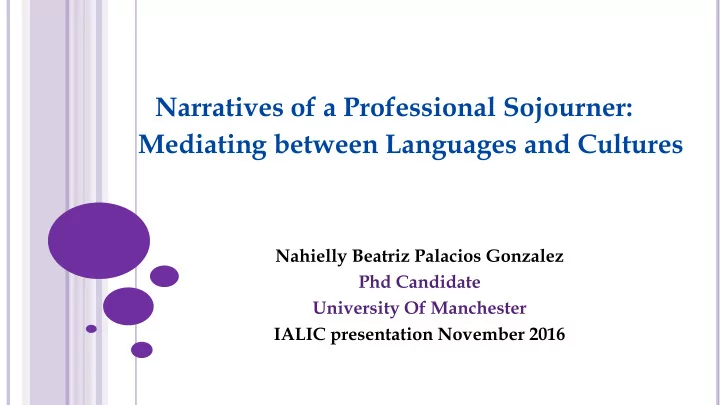

Narratives of a Professional Sojourner: Mediating between Languages and Cultures Nahielly Beatriz Palacios Gonzalez Phd Candidate University Of Manchester IALIC presentation November 2016
A BOUT ME …
I NTERCONNECTED WORLD “Our world is experiencing an increasingly complex interconnectedness both locally and globally” (O’Nelli , 2013, p.387). People from diverse cultural and linguistic backgrounds are increasingly coming into contact with one another (O’ Neill, 2013).
I NTERCONNECTED WORLD “Our world is experiencing People may come into an increasingly complex contact with one another for interconnectedness both different reasons, in different locally and globally” ways and for different ( O’Nelli , 2013, p.387). periods of time.
I NTERCONNECTED WORLD Professional sojourners
I am currently doing my PhD and P ROFESSIONAL SOJOURNERS working as a TA in the UK People who migrate temporarily to another place (e.g. inside or outside their own country) mainly with professional purposes.
My own lived experiences as a professional sojourner As a postgraduate researcher and teacher assistant of the University of Manchester, I interact in different contexts and with different people who like me have a different socio- linguistic and cultural background. I am always experiencing a wide range of intercultural encounters inside and outside the University.
I realised that I am constantly developing and operationalising my intercultural communicative competence. I understood the need to better understand the experience of moving between languages and cultures. Stepping back and reflecting on situations, interactions with people etc. Being aware and reflective in situations. Academic experience Teacher assistant experience Supervisory team experience Research project experience
ACADEMIC EXPERIENCE My experiences as an International Student o MA TESOL (Intercultural Education) 2013-2014 o 1 st year PhD 2015-2016 Multicultural and Multilingual classes. ‘Sensitive to ways of communicating, Acknowledge the identities of others, be aware of my assumptions stereotypes and prejudices, respect otherness ‘(Byram et al, 2009, p.5). Get involved with people. Academic changes Classes, participation, classrooms arrangement. Critical thinking / Academic writing. Academic-culture shock.
TEACHER ASSISTANT EXPERIENCE Things I constantly reminded myself while teaching…. ‘Study Skills’ course unit (PhD 2015-2016) Acknowledge that students have their own academic experience (e.g. ways of studying, acting and behaving in class, ways of expressing their opinion {orally or in a written and oral way} etc.). Give students space and time so that they could get to know each other, interact in class, talk about themselves, their countries etc. Build up the ‘study skills group’ /classroom culture (Holliday 1994) and to relate to one another. Encourage students to compare their previous academic experiences with their current ones so that they could create new academic experiences and help themselves in the process.
Believe that all my students can learn regardless of level of language proficiency in English Use heterogeneous cooperative grouping to promote scaffolding of content learning through peer interactions. See the use of L1 among students as a way for them to clarify points. Illustrate when possible academic practices (e.g. paraphrasing, referencing, agreeing, disagreeing, critical thinking…) Educate myself on the cultural backgrounds of my students (Major, 2006) I believe these reminders helped me to be a better mediator between the students’ previous and new academic experiences
S UPERVISORY TEAM EXPERIENCES More Intercultural encounters Calling my supervisors by their name Starting our sessions in a pleasant environment. Sharing my ongoing research ideas and listening to their views. Making sense of the meetings in my own language.
M Y RESEARCH PROJECT Talking about my project with my friends, family and colleagues back in Mexico and navigating my research ideas in English and Spanish helps me to better understand my project. ** Data collection is in Spanish* Translating the data gathered**
R EFERENCES Altbach, P.G and Knight, J. (2007). The internationalization of higher education: Motivations and realities. Journal of Studies in International Education , 11 (3/4), 290- 305. Byram, M., Barret, M., Ipgrave, J., Jackson, R. and García, M. (2009). Autobiography of Intercultural encounters, Context, concepts and theories. Council of Europe. Dolby, N. (2007). Reflections on nation: American undergraduates and education abroad. Journal of Studies in International Education , 11 (2), 141-56. Held, D., McGrew,A., Goldblatt, D., and Perraton, J. (1999). Global transformations: Politics, Economics, and Culture . Cambridge: Polity Press Jackson, J., 2015. Becoming interculturally competent: Theory to practice in international education. International Journal of Intercultural Relations , 48, pp.1 – 17.
R EFERENCES Holliday, A. (2016). PhD students, interculturality, reflexivity, community and internationalisation. Journal of Multilingual and Multicultural Development , 1-13. Holliday, A. (2013). Understanding Intercultural Communication Negotiating a Grammar of Culture. London: Routledge Jenkins, J. (2013). English as a lingua franca in the international university: The politics of academic English language policy . London: Routledge. Maringe, F., & Foskett, N. (Eds.). (2010). Globalization and internationalization in higher education: Theoretical, strategic and management perspectives . London: Continuum. Major, E. (2006) ‘Secondary Teachers as Cultural Mediators for Language Minority Students’, The Clearing House , 80(1), pp. 29 – 32. doi: 10.3200/TCHS.80.1.29-32. Wingate, U. (2014). Approaches to acculturating novice writers into academic literacy. In Lyda, A. & Warchał, K. (Eds.), Occupying niches: Interculturality, cross-culturality and aculturality in academic research , (pp. 103 – 118). New York: Springer.
WIKI SPACE https://mcrstudyskills.wikispaces.com/Written+task+1.+Session+6.
C OMBATTING PREJUDICE – «M EXICAN » ‘Dealing with being Othered’ (Holliday, 2013) Othering can be understood as ‘reducing a group of people to a negative stereotype’ (Holliday, 2013).
I MPLICATIONS FOR EDUCATIONAL INSTITUTIONS Intercultural Training may be given to all students, academics and staff. Build up a classroom culture together with students. Promote the use of L1 groups as support groups where students can clarify ideas, have higher- order discussions, critical friends. Promote the use of counter narratives as a tool to combat prejudice
…S OCIAL INTERCONNECTEDNESS “The dramatic increase of this social interconnectedness has pushed the 21 st century higher education toward greater international development” (Altbach and Knight, 2007: 290).
Recommend
More recommend